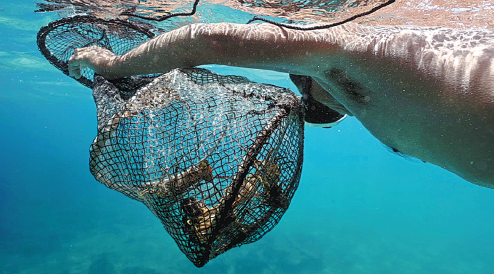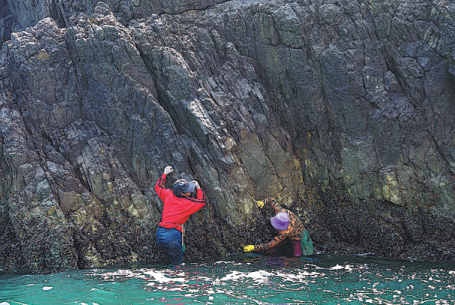Shaped by the sea
The latest season of a popular documentary series focuses on Chinese fisherfolk, Xu Fan reports.

Wrapped in a waterproof bodysuit, Yan Jiujian, a seasoned fisherman from Huludao in Liaoning province, hops into a vast area of shallow sea.
Located on one of China's largest tidal flats, the body of water, standing at an average of around 1 meter deep, is a bed of cockles.
Many viewers may consider Yan's look-with his tanned skin and calloused hands, as well as his cockle-picking tools-as matching their imagination of a typical fisherman. However, there is something poetic about him.
During his spare time, the middle-aged man dives into the world of songci, a classical type of Chinese poetry that reached its peak during the Song Dynasty (960-1279).
Yan's hobbies vary from writing down ancient poet Lu You's classics, such as Chai Tou Feng (depicting a tragic romance), as a way of practicing calligraphy, to reading late novelist Louis Cha's martial arts books.
As one of the 20-plus stories featured in the third season of Once Upon a Bite, a popular documentary series that is currently available on the streaming platform Tencent Video, Yan has garnered a lot of attention, with some online comments hailing him as "an interesting soul".
The depiction can be regarded as a shared characteristic of the people shown in the production. Helmed by Chen Xiaoqing and Li Yong, both serving as chief directors of a team of 10 directors for the eight episodes, the latest season-again featuring the renowned voice-over actor Li Lihong-has turned the lens to China's sprawling 32,000-kilometer coastline.
So far earning 8.7 points out of 10 on the popular review aggregator Douban, the project, which started filming in June 2020, took a total of 18 months to finish, with trips across eight provinces-from Liaoning in the northeast to Hainan in the south-as well as Southwest China's Chongqing city.
More than 30 types of traditional seafood delicacies are featured among a bunch of human interest stories, mostly starting from how local fishermen capture or raise the edible marine creatures, to joyful moments at family meals.
"This time, our stories are more about people and their families," says Chen, also a documentary filmmaker who established his fame with the smash hit A Bite of China.
The latest season is different from the previous two, which premiered respectively in 2018 and 2020, Chen says, adding that the production team decided at the very beginning to choose families with children.
"As most industry insiders know, it's easier to handle conversations with children when shooting a documentary. The youngsters usually respond more naturally in front of the camera, with less stress or concern," Chen says.
As one of the most popular "stars" in the documentary, Lin Benben, an 8-year-old boy from a fisherman's family in Dongxiang Island in Fujian province, grabbed the attention of Yang Chao, the director for the first episode, with his adorable personality.
While the furthest city that Benben has visited with his parents is Fuzhou, the provincial capital of Fujian, the boy shows his knowledge of geography by talking about African countries. His cautious complaint about his demanding parents, who push him hard to do his homework, but also work hard to give him nutritious food, has struck a chord with the audience.
More instances of family ties in the documentary series include an elderly fisherman diving to catch lobsters with his bare hands to make a delicacy for his young granddaughter; a father joining dozens of local villagers at 2 am to catch sea fish in Guangdong province; and a veteran sailor, who has worked on the sea for nearly 50 years, netting shrimp to make a special type of sauce for his grandson, who he has not seen for some time.
Aside from these heartwarming moments, the documentary also captures some breathtaking scenes, featuring industrious fisherfolk facing off against raging waves to extract their harvest from the rough sea.
The second episode shows a 58-year-old female villager alongside two friends, both almost 70, climbing slippery rocks on the Zhoushan Islands in East China's Zhejiang province. With the villager's husband piloting a small boat nearby to monitor weather changes, the women cautiously catch Capitulum mitella (a type of barnacles attached to rocky cracks), with no protective garments. A big wave could easily sweep them into the water, hence they rely on the man to retrieve them with the boat.
As an effort to reexamine the relationship between humans and nature through such stories, Chen says modern city life has resulted in young viewers knowing less about primitive and traditional fishing methods.
"The domestic audience will discover that most seafood is not easy to get, despite some being commonly seen on dining tables. We also want the audience to learn more about how our ancestors lived and their courage and intelligence, which allowed them to survive and thrive in nature," he says.
Most of the directors, whose university majors vary from cinema to history, also had limited knowledge about the ocean and the fishing industry before starting the project.
Chen says that the team spent a lot of time conducting research, ranging from reading ocean-themed books to inviting experts to give lectures.
"Like many other countries, ours has a rich and diverse maritime civilization that has played a pivotal part in our history and culture," says Chen.
As transportation was underdeveloped in ancient times compared to today, residential communities along coastlines were mostly isolated, making styles of cooking or preserving seafood quite diverse.
"Such legacies also provide us with rich material to research the cultures and civilizations shaped by the sea," he adds.



Today's Top News
- Summit a key moment for China-EU ties
- Unstable political landscape seen in Japan amid election
- Intl unity in fighting fascism recalled
- Pragmatic discussions can illuminate the way to a brighter future for China-EU ties
- Ruling parties suffer major defeat in Japan's upper house election
- China, EU to hold 25th China-EU Summit in Beijing






























